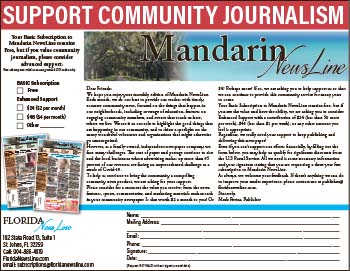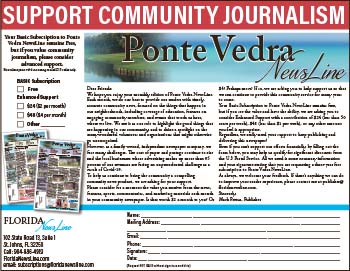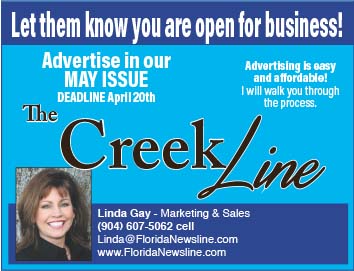By Lesley Arrandale
mail@floridanewsline.com
Gardening can be a lifelong pleasure, but as the years have passed, I’ve realized one’s aims can change. My ideal used to be an English garden, with perfumed lilacs, hybrid tea roses, billowing apple trees, stately flag irises, luscious peonies, an immaculate lawn — the list goes on — most of which are downright pointless even to consider in our climate.
As I learned about Florida’s native plants and the animals and birds that call Florida home, it became increasingly important for me to make my yard Florida-Friendly. Vast swathes of woodlands around Jacksonville have been replaced by new highways and urban developments, and innumerable creatures have lost their homes. In addition, older trees are declining and being removed from our established neighborhoods and we have no control over habitat in the birds’ wintering grounds in Central and South America. I can’t help but conclude that birds like goldfinches and indigo buntings, which no longer migrate through my yard in sizeable flocks, have felt the impact.
So what does this mean for local wildlife in gardening terms? Basically, plant what they need, in ways that they need it. Whenever we make changes to our yards, for whatever reasons, we can consider the needs of wildlife — birds, bees and butterflies — and resolve to make them more inviting. Water, food and shelter are basic requirements. Which shrubs will shelter birds? Which will supply food in leaf, flower, fruit or nut form? By layering the landscape — growing plants of different heights, from short groundcovers and perennials to large shrubs or trees — we can mimic the forest edge, the most productive of environments.
Two excellent books, available from the library, are “Native Plant Landscaping for Florida Wildlife,” by Craig N. Huegel and “The Art of Maintaining a Florida Native Landscape,” by Ginny Stibolt. Huegel describes a wide palette of plants and their particular values to wildlife. Stibolt takes things a step further, with practical ways to keep our suburban yards looking good and functioning well. While certainly not maintenance free, a native yard needs less input than a traditional landscape — for which we can be grateful!
For other reliable resources, refer to the Florida Yards and Neighborhoods website: http://tinyurl.com/he6qyr8 For greater detail, see http://edis.ifas.ufl.edu/uw175.
I recently cut down a huge, hollow hickory tree which was really too close to our house. To compensate, I left a snag about 12 to 15 feet high, which we girdled in order to kill it, and I shall plant native vines around it to attract hummingbirds. In time, the local woodpeckers should find it a good source of insects and perhaps a potential nesting site. In front of the snag I envision a variety of sun loving, drought-tolerant shrubs, clumping grasses and wildflowers, which should encourage butterflies (see http://edis.ifas.ufl.edu/uw057) and a wider variety of pollinators.
The informal trial of grafted versus non-grafted tomatoes undertaken by some master gardeners and Extension staff is well underway. It seems the grafting technique is a little difficult; there have been some grafts which have failed due to low humidity. Commercially grafted plants and non-grafted types are doing well. The aim is to compare yields of plants grown in similar conditions. We shall see the results when the weights and numbers of fruits are recorded.
As always, don’t forget to check out the latest issue of A New Leaf newsletter (http://tinyurl.com/jq8q6mz), especially the articles on “Things to do…” and “What to plant…” Call the Extension Office at (904) 255 7450 to request an email version; if you don’t have internet access you can receive a copy by mail.
Happy gardening, everyone.
Lesley Arrandale is a Master Gardener with the Duval County Cooperative Extension Service/City of Jacksonville Agriculture Department, which is a partnership between the United State Department of Agriculture (USDA), the University of Florida Institute of Food and Agricultural Sciences (UF/IFAS) and the City of Jacksonville.











